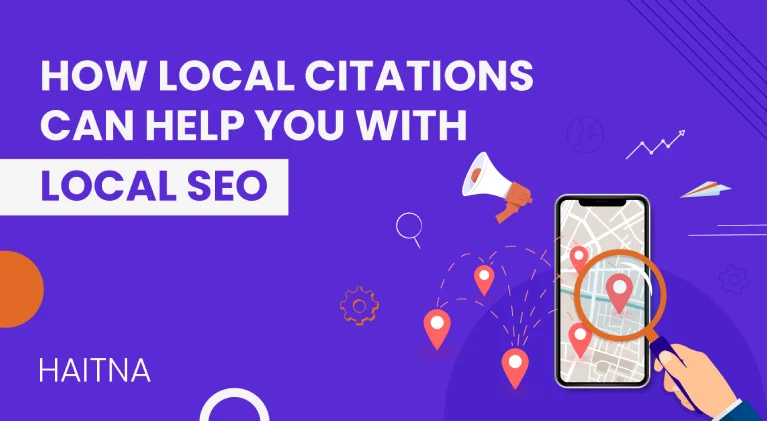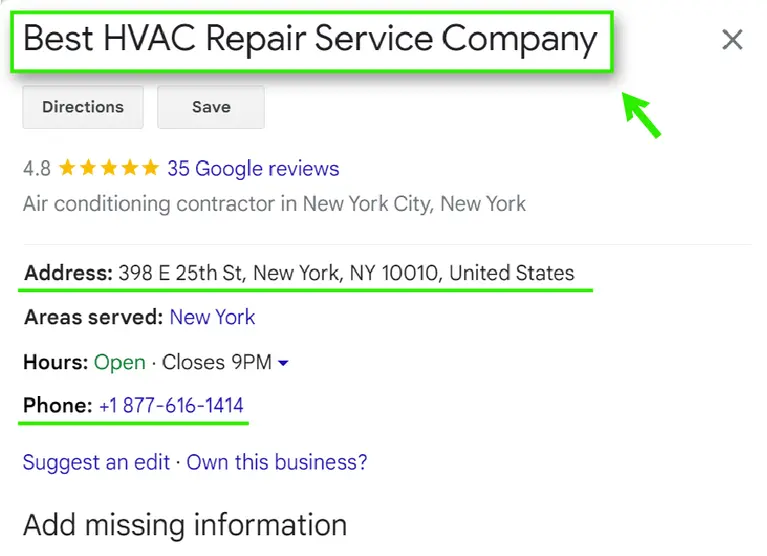
How Local Citations Can Help You with Local SEO
What Is A Local Citation?
A local citation refers to a local business by an external site. These references generally display the name, address, and phone number of a business (NAP). For example, a listing on Google My Business is the best example of a citation.

However, some citation sites also offer additional business information like images, offers, reviews & ratings, etc.
And the most common local citation sources include business directories and listing sites.
But, one can also earn local citations from PR mentions, external blog mentions, reviews, etc.
Read: Step-by-step Setup Guide for Google My Business Set up
How Local Citations Can Help You with Local SEO
1. Local Citations Factor in Local Search Rankings
Your local citation efforts have a say in your Google Rankings.
Google considers your existence when your business is listed across several reputed listing platforms. Moreover, the consistency of your information on platforms exudes trust and credibility.
So, local citations give Google a sense of confidence in your business. And it also factors as a ranking parameter for local businesses.Hence, it also increases the chances of a business appearing on SERP through citations. Here’s an example of the same:

According to Moz, local citations contribute the 5th most valuable factor for local search rankings.
So, you must build comprehensive listings on popular local citation platforms. Some of these sites include:
Expect from creating listings here; you need to list on platforms specific to your business category.
For example, a restaurant business needs to be on Yelp. A real estate business will receive great value by listing on realtor.com. And a local photographer must display his existence on Snappr and Upwork.
The relevancy of your citations significantly adds trust and authority. And so, relevant citations offer you an eminent SEO value.
Read: Local Search Ranking Factors
2. Show Up to Ideal Customers
Popular listing sites generally have a higher authority than individual local businesses. And they are highly likely to show up in the top search results for local business queries.
For example, a search query for "best dinner places San Francisco" shows more citation sites in top results

That said, if you list on the popular citation sites, you are more likely to show up to your ideal customers.
So, you can do the exercise of finding the most relevant listing platforms for you by searching on Google. A search like "your business + location" will give you essential listings in the results.
Also, ensure you make the listings comprehensive and consistent across the internet.
3. Win Valuable Referral Traffic
Some consumers directly switch to business listing platforms to search for local businesses.
They trust these platforms for their sorting algorithm and get many options in one place.
For example, Yelp is a reputed platform for finding restaurants. They can sort easily using the menu, ratings & reviews, and approximate pricing.
Take a look at the below screenshot showing restaurants in San Francisco along with NAP, local reviews, and directions.

Moreover, platforms like OpenTable, Resy.com allow you to reserve a table online.
GrubHub and Doordash are platforms that allow customers to book online orders from their favorite restaurants.
So, these platforms attract a huge number of searches daily.
Thus, local citations can drive significant referral traffic to your site. Moreover, it can drive you direct inquiries, orders, and store visits.
Some tips to make your listings comprehensive and dominate the business directory platforms
- NAP Consistency: Establish trust with consistency in your business name, address, and contact details.You can keep a check on this by regularly testing your NAP on Mozlocal to see if it’s accurate on directories.
- Detailed Business Categories: Highlight your primary business category and sub-categories. Check the sub-categories listed by your competitors for inspiration.

- Products/Services: Highlight your products/services and add sub-services.
- Comprehensive Description: Use the 750 characters to define your business mission and service/product range. Moreover, use the description to showcase your USPs and location-specific keywords.
- Business Hours: Update your store hours and service hours.
- Reviews & Ratings: Ratings & Ratings wins you higher social proof and SEO value. So, you must invest effort in your feedback generation strategy.
- Images: Showcase your store ambiance, products, menu, services, staff, etc., by leveraging the images feature.
Posts/Offers: Many listing platforms (GMB, Yelp, etc.) allow you to showcase your offers. Use these to attract direct inquiries.
4. Build Backlinks from Unstructured Citations
Unstructured citations generally draw your brand a better SEO value than structured citations. Moreover, unstructured citations usually offer you a 'Dofollow' backlink to your site.
Your PR mentions, guest blog submissions, blog mentions, etc., fall in this category.
So, naturally earned unstructured citations can bring good authority to your business.
For example,
Your salon business gets featured in a popular blog like "best hairstyling artists in (your city)." This citation draws direct inquiries, credibility, and social proof. And you also receive a backlink to your site.
The domains having a good number of backlinks are likely to rank on top of SERP and receive quality traffic.
Here’s an example:

So, you must invest plentiful of efforts in drawing unstructured citations too.
Here are some tips you must follow
- Use the skyscraper technique by checking what content is drawing backlinks for your content. You can craft more valuable content on that topic and promote it to attract backlinks.
- Also, produce quality content and share it aggressively on social media. As your content reaches more webmasters and it can draw you unstructured citations.
- Collaborate with relevant sites for guest posts or employ PR outreach
- Try to connect with local bloggers who would like to review your business or cover it in their new blog.
5. Grow Brand Awareness and Reinforce Brand Popularity
You grow your business exposure by listing your business across several popular directories and aggregator platforms.
Now, when a consumer comes across your business over multiple listings, it reinforces your brand in his sub-conscience.
Moreover, these create multiple check-points for your business. And consistent information on these listings also generates trust and brand familiarity.
More consumers become aware of your local business, and you see a growth in inquiries. Possibly, you might witness a rise in the store footfalls.
A valuable tip is to list your business in your niche-specific directories along with local directories.For instance, if you're into healthcare, listing yourself in sites like Caredash, Vitals, etc., will help reach the potential audience.

Here, Brightlocal has done the weightlifting for you by coming up with this niche-specific citations list.
Scroll through this list to find your industry-specific citation platforms. And then, you can manually list on several listing platforms.
6. Local Citations Help You Rank for Local 3-Pack Results
Local 3-pack results dominate position zero on the SERPs for local-intent queries.
These results make it to the top for about 93% of local search queries on Google.
Moreover, the local 3-pack results capture more clicks than the general organic results. On average, the CTR of these results is 100% higher.
According to a survey, your local citations build your location authority. This is why you have to add your business on listings and the map, as shown in the below image.

And this location authority forms a valuable ranking signal for compiling the Local 3-Pack results.
Here is how the local 3-pack results for "HVAC companies in Austin" look

These results display a fair amount of information to attract qualified inquiries for local businesses. One can see the website link, location, ratings, phone no., timings, etc.
So, local citations and local reviews together help you steal one of these top 3 positions.
A fair amount of weightage is on your GMB listing, so optimize it and encourage reviews on it.
Read: Tips to Rank on Google Local 3-pack
7. Local Citations Build Trust & Credibility
Today, both buying actions and consumer behavior are driven by social proof. And 82% of consumers on the internet research and check reviews before buying from a business.
That said, local citations also play a crucial role in building trust & credibility.
Consistent business info across reputed directories reflects authenticity. Google also values this information and deems your business eligible for rankings.
Moreover, when consumers find consistent business info on your listings, they trust your brand.
They also start relying on your listings for updates (timings, offers, new products, etc.).
Moreover, positive reviews on your listings further add to the social proof.
Take a look at the below screenshot, which has 4.9* out of 351 reviews, which shows high credibility and trust.

So, SurveyMonkey, GetFeedback are reliable tools to make feedback generation easy.
You can also set regular feedback email channels or request feedback on social media.
An overall increase in credibility translates into growth in inquiries and store footfall traffic.
What Are the Different Types of Citations
a) Structured Citations
When a business directory mentions your business information, it forms a structured citation.
Here the business itself can request business directories or listing platforms for the mentions. And these platforms add the business information in a structured way.
They are likely to add several types of information related to a business. These include the business name, category, services, description, images, opening hours, areas of service, etc.

Except for your local directories, you can list them on industry-specific directories. These structured citations help you find the right business exposure and build local SEO value.
However, structured citations generally do not share Dofollow links.
Some platforms that pass structured citations include
Google My Business, Yelp, Apple Maps, Foursquare, Superpages, Facebook, Realtor.com, Lawyers.com, etc.
b) Unstructured Citations
Unstructured citations include your business mentions from sites other than business directories or listings. These can include PR sites, blogs, other 3rd party official websites, etc.
For example, A blog with "10 best food to try in Austin" lists one of your recipes and your restaurant. Moreover, they even give you a backlink to your site.
This is a valuable unstructured citation for your business.
A similar example:

Usually, unstructured citations also source you a backlink. However, this isn't necessary.
And these citations do not have a fixed format, and the mentioning structure depends upon the editor.
Your PR collaborations, content sharing, guest posting, and link-building efforts can draw you unstructured citations.
Quick Tips to Get Local Citations
1. Attract Citations from Popular Business Listing Platforms
Manual directory submissions can be daunting. However, you must do the manual exercise for getting your business listed on popular platforms like:
- Google My Business
- Yelp
- TripAdvisor
- Apple Maps
- Foursquare
- Facebook and LinkedIn
- Bing Places
- BBB
- Expertise
- Angi
These platforms are popular in the US and attract a global audience. You can use this list to check the popular business listing sites across the US.
Before hopping onto this list, check if your business is already claimed on these sites and if it’s present, look for the accuracy of the information using Brightlocal.

However, you might not want to manually list your business across all the sites in this list. So, you must list only on platforms that seem popular. Rest, you can let the data aggregators (discussed below) take care of other listings.
2. List Your Business with the Data Aggregators
Business listing can be a continuous process. And you might not want to submit across hundreds of business directories manually.
Moreover, there can be inconsistent data, pending approvals, and loss of efforts in manual submission.
So, you can rely on data aggregators for submitting the information across several listings.
These aggregators manage the consistency of your information and manage the listing process.
The top data aggregators for the US businesses include:
a) Express Update
You can directly register on this aggregator and search for your business. If you find your business, you can simply check the information's accuracy and claim it.
You might need to modify the business information for accuracy in the case of duplicates. Moreover, if your business is not searchable, you can create a new business profile.
The aggregator provides this service free of cost.
b) Neustar Localeze
This aggregator also helps you list your business across many directories in the US. You need to thoroughly look for your business if it is present in some directories. If you find your business, you can claim it directly without any cost. You just need to put your business name and Zipcode to find your listings.

c) Vendasta
This aggregator doesn't allow you to claim your business listing directly.
However, you can search for your business listing through the platform. If you find an accurate listing here, you are good to go. Meanwhile, if you fail to find a correct listing, you must connect with Trusted Data Contributor (TDC).
A TDC would help you claim your business at small fees.
3. Plan Listings on Niche-specific Sites and Do Competitor Analysis
Many local businesses are less familiar with the SEO world. And they may fail to pin down the best listing sites for their business.
In this case, you can easily use the Yext tool. It helps you list your business on some of the most popular listing sites.
However, if you do not want to bear their service cost, you can do it manually.
Use Yext's Business Scan tool to scan if your business is listed on "most important" platforms. If the tool shows a "Missing Listing" error for a platform, you can manually list on that platform.

- Further, you can find local business listing sites directly through Google.
Use search queries like "[location] business directory" and "[location] chamber of commerce"
- You can also use the same technique for industry-specific listing sites.
Use search queries like "[location] business listings"
You can also leverage this list from Bright Local to find you industry-specific listing sites.
Another valuable tip is to leverage tools like Google Alerts and Mention to track brand mentions of your competitors. If your close competitor is listing on a good platform, you can also draw citations by listing there.
4. Build Valuable Unstructured Citations
So, if you have already built some prominent local citations, you must head over to building unstructured citations.
The exercise of building unstructured citations is a little daunting. But, they bring a greater SEO value with them, especially when they bring a backlink.
As aforementioned, these citations come from PR mentions, blog mentions, reviews, etc.
Some ways you can draw unstructured citations for your local business include
- Collaborating and convincing a blogger or influencer to review your business and offering, he can mention his review experience in his blog.
- You can also use the HARO platform. Here reporters are looking for experts who could contribute to their press reports.Register as a source to receive several content requests from journalists every day.

You can sign up on the platform and check the daily queries by different reporters. If you find a query relevant to your expertise, you can pitch your contribution.
- You can use SEMRush, BuzzSumo, or Ahrefs to check the unstructured citations for your competitors. Head over to their link profile and check from where they draw backlinks.
You can produce similar content, pitch to similar webmasters, and draw citations.
Key Takeaways
Local citations are crucial when gearing to build local SEO visibility. It brings benefits like
- These citations have a say in your brand's local search visibility
- They increase the referral traffic on your site
- Your business appears to the customers who directly search through business directories
- Unstructured citations draw you good SEO value through backlinks
- Citations from popular platforms and positive reviews on these platforms grow your brand's credibility
Also, try these sorted ways to help you build local citations
- Make your listings possible through data aggregator services (Express Update, Factual, Neustar Localeze)
- Manually list popular directories in your location (GMB, Yelp, BBB, Facebook, TripAdvisor, etc.)
- Use Yext's Business Scan to check if you are missing on any important directory; If yes, list there
- Use HARO for collaborating with a reporter and gaining press mentions
- Use Mention.com to check competitor's mentions and list on suitable platforms
- Use Ahrefs or SEMRush to check if you can win unstructured citations from the same place as your competitors
ABOUT THE AUTHOR:
Brice Decker

Brice has been handling marketing projects for more than 12 years and he is providing consulting services on SEO, Social Media and PPC. He has a huge expertise in working at large corporations including Accenture Interactive & PwC Digital Services.
ABOUT THE AUTHOR:
Brice Decker

Brice has been handling marketing projects for more than 12 years and he is providing consulting services on SEO, Social Media and PPC. He has a huge expertise in working at large corporations including Accenture Interactive & PwC Digital Services.
Related Post
Tips to Choose Local SEO Agency
Common Google My Business Mistakes
Effect of Covid on Local Marketers
Video Marketing for Local Businesses
Pr Outreach for Local Businesses
Tips to Rank on Google Local 3-Pack
Metrics to Track in Local SEO Audit
SMM Benefits for Local Businesses
Local SEO Tips to Drive Foot Traffic
How Local SEO Firm Save Your Money
Local 3-Pack for Small Businesses
Content Type That Helps Local SEO
Offline Advertising Tips for Local Businesses
Tips to Handle Local Competition
Tips to Gain Quality Links for Local SEO
Promote Local Businesses Using Instagram
Increase Site Speed of Local Businesses
Do Local Businesses Need a Website
Business That Benefit From Local SEO
Technical SEO for Local Businesses
Optimize for Google Local 3-Pack
Hyperlocal Marketing for Business Growth
Tips to Promote Local Biz on Facebook
Local SEO Mistakes Moving Companies Make
Local Business Directories Benefits and Tips to Use
Blogging Tips for Local Businesses